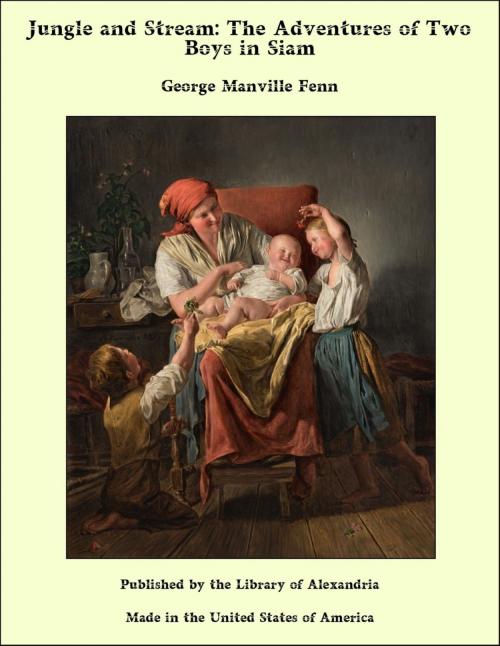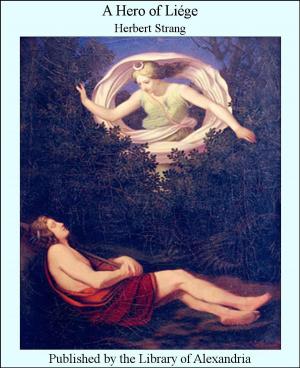Jungle and Stream: The Adventures of Two Boys in Siam
Nonfiction, Religion & Spirituality, New Age, History, Fiction & Literature| Author: | George Manville Fenn | ISBN: | 9781465620484 |
| Publisher: | Library of Alexandria | Publication: | March 8, 2015 |
| Imprint: | Language: | English |
| Author: | George Manville Fenn |
| ISBN: | 9781465620484 |
| Publisher: | Library of Alexandria |
| Publication: | March 8, 2015 |
| Imprint: | |
| Language: | English |
The garden was beautiful in its wildness, the trees having been left for shade; and John Kenyon, the East India merchant, who had settled far up one of the rivers of Siam ten years before, after the death of his wife, had found out from long experience that he who tries to make an English garden in a tropical country has worry for crops, while he who encourages the native growths makes his home a place of beauty. So Harry Kenyon sauntered down, keeping out of the hot rays of the early morning sun—hot enough, though it was only six, for people rise early in the East—and made his way to the bamboo platform beneath which the river, here about a hundred yards wide, looked like a stream whose waters had been transformed into a decoction of coffee and chicory, with the milk left out, or, as Harry once said, muddy soup. The creepers, crowded with many-coloured blossoms, hung down from the trees and ran over the roof, forming, with the dry palm-leaves, nesting and hiding places for plenty of natural history objects from the neighbouring jungle. Birds nested there, and rats and snakes came birds'-nesting, while lizards of various kinds, from the little active fly-catchers to the great shrieking tokay, found that roof an admirable resting-place. There were sundry rustlings overhead as Harry stepped on to the slippery, squeaking, yielding bamboos; but use is second nature, and ten years in such company, without reckoning the inhabitants of the jungle, had made the boy so familiar with many of these things that he looked upon them with a calm contempt. As a matter of course he would have swarmed up a tree fast enough at the sight of a tiger or elephant in either of the forest tracks, or, to use Mike's expression, have made himself scarce if he had encountered a cobra, or seen one of the great boas swaying to and fro from the gigantic limb of a tree. Even at the moment of stepping upon the covered-in summerhouse-like landing-stage, with its fishing-rods laid up overhead in the bamboo rafters, he shrank a little, and then angrily bared his teeth as he stood gazing down at the water a dozen yards away.
The garden was beautiful in its wildness, the trees having been left for shade; and John Kenyon, the East India merchant, who had settled far up one of the rivers of Siam ten years before, after the death of his wife, had found out from long experience that he who tries to make an English garden in a tropical country has worry for crops, while he who encourages the native growths makes his home a place of beauty. So Harry Kenyon sauntered down, keeping out of the hot rays of the early morning sun—hot enough, though it was only six, for people rise early in the East—and made his way to the bamboo platform beneath which the river, here about a hundred yards wide, looked like a stream whose waters had been transformed into a decoction of coffee and chicory, with the milk left out, or, as Harry once said, muddy soup. The creepers, crowded with many-coloured blossoms, hung down from the trees and ran over the roof, forming, with the dry palm-leaves, nesting and hiding places for plenty of natural history objects from the neighbouring jungle. Birds nested there, and rats and snakes came birds'-nesting, while lizards of various kinds, from the little active fly-catchers to the great shrieking tokay, found that roof an admirable resting-place. There were sundry rustlings overhead as Harry stepped on to the slippery, squeaking, yielding bamboos; but use is second nature, and ten years in such company, without reckoning the inhabitants of the jungle, had made the boy so familiar with many of these things that he looked upon them with a calm contempt. As a matter of course he would have swarmed up a tree fast enough at the sight of a tiger or elephant in either of the forest tracks, or, to use Mike's expression, have made himself scarce if he had encountered a cobra, or seen one of the great boas swaying to and fro from the gigantic limb of a tree. Even at the moment of stepping upon the covered-in summerhouse-like landing-stage, with its fishing-rods laid up overhead in the bamboo rafters, he shrank a little, and then angrily bared his teeth as he stood gazing down at the water a dozen yards away.















